Pythons and alligators did not share a natural habitat until the former was introduced into the Florida Everglades some years back. Now, the two are fighting a battle to be the apex predator in these swampy areas. That begs the question of which reptile wins a python vs alligator battle?
While we have enough footage of the two interacting to figure out how the fights pan out most of the time, we can also use available data about both creatures to learn what determines the winner. Discover the most important factors in a fight between these two reptiles and see how they influence their battles!
Comparing a Python and an Alligator
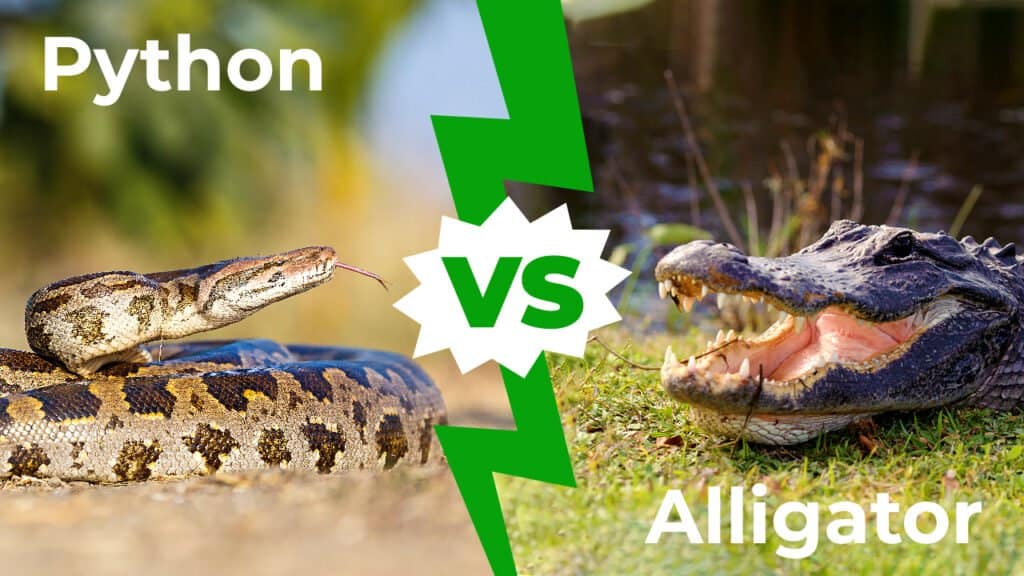
| Python | Alligator | |
| Size | Weight: 200lbs Length: 10-28 feet | Weight: 400lbs to 800lbs (sometimes more) Height: 1ft – 2ft off the ground Length: 8.2 feet to 11.2 feet long |
| Speed and Movement Type | – 1mph – 2-3 mph in water (some species) – Slithers on the ground and in trees | – 30 mph over short distances on land – Locomotion includes swimming and quick scampers on the ground. |
| Attacking Method Stats | – 14 PSI crushing power (measured on a 5.5-meter python) – 100 sharp, rear-pointing teeth that help them eat. | – 2,980 PSI bite power – Roughly 80 teeth – Teeth roughly 2” in length |
| Senses | – Use Jacobson’s organ to smell very well, darting their tongue out to gain information – Poor typical eyesight but capable of “seeing” heat. – Can hear low frequencies. | – Poor vision in water due to protective membrane – Good sight on land – Highly receptive to vibrations – Strong sense of smell. |
| Defenses | – Large size – Hides well – Camouflage makes it hard to see | – Camouflage – Speed – Hissing threat display |
| Offensive Capabilities | – Painful, non-venomous bite – Bite is often not severe enough to cause fatality – Powerful constriction that deals internal damage and suffocates | – Powerful bite – Death roll can instantly amputate – Speed allows for devastatingly quick attacks to occur |
| Predatory Behavior | – Ambush hunter – Active at night – Bites and holds prey and then wraps and constricts them | – Ambush prey by keeping eyes and nostrils above water – Clamp onto enemies and use a death roll |
The Key Factors in a Fight Between a Python and an Alligator
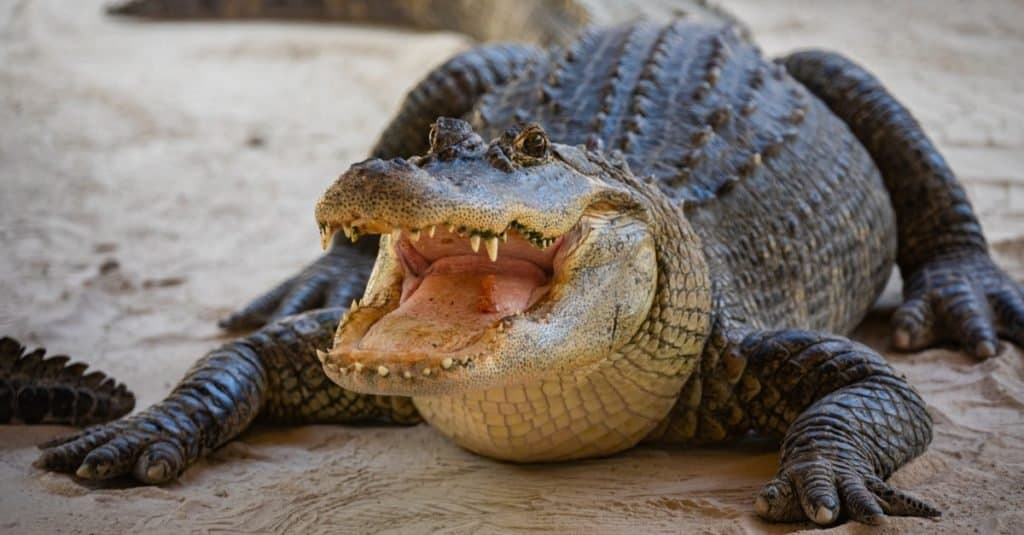
The battle between an alligator and a python usually comes down to size and strength.
©Mia2you/Shutterstock.com
We could spend all day listing features of pythons and gators, but little of that information really matters in a fight between the two. Instead, we have come up with six dimensions of data that actually influence the fight between gators and these snakes.
Specifically, we are looking at five distinct physical features along with the creatures’ fighting abilities to determine who has the edge and is most likely to win.
Physical Features of a Python and an Alligator
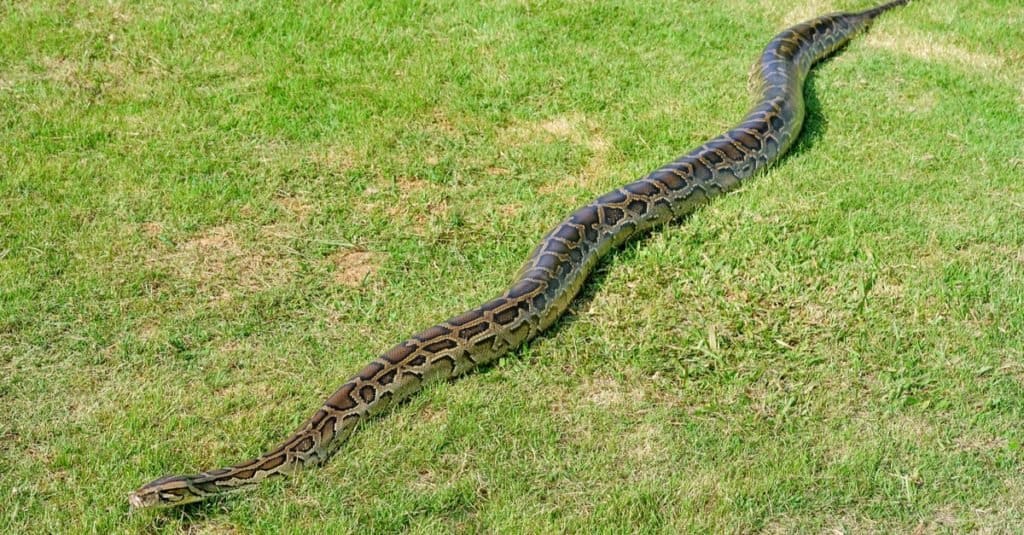
Pythons can reach 28ft in length and weigh 200lbs!
©Yatra/Shutterstock.com
The law of the wild states that bigger and stronger creatures tends to win fights against their enemies. See how pythons and alligators stack up against each other and which reptile has the greater physical advantages against the other.
Python vs Alligator: Size
Pythons can be very large creatures, reaching amazing lengths of 28 feet and weighing 200lbs, all of which they will wrap around their enemies. Pythons commonly compete with anacondas for the title of biggest snake in the world. Alligators can be quite massive, too. They reach a top weight of 800lbs and grow up to 11 feet long. The largest alligator ever recorded weighed a massive 1,380 pounds!
Alligators are heavier but shorter than pythons, but they still get the overall size advantage for sheer mass.
Python vs Alligator: Speed and Movement
Catching prey is an important business for both creatures, and they need speed to make that happen. Pythons can only move about 1mph on land, but they can reach 2-3mph in the water. Their slithering motion is slow and makes it hard for them to evade predators.
Alligators are large creatures that can still reach speeds of 30mph over short distances. They also spend a significant amount of time in the water, where they can move at speeds of 5mph or less.
Alligators are faster than pythons and have a more effective form of locomotion.
Python vs Alligator: Attacking Method Stats
Pythons can inflict 14PSI of crushing power on their enemies by biting and coiling around them and they also have 100, rear-pointing teeth to help them latch onto an enemy and eat them.
Alligators use their bite to directly kill their foes. They have one of the most powerful bites on the planet, measuring 2,980PSI and driving 80, 2-inch teeth into their enemies. The bite is just the beginning of their killing ability, though.
In terms of attacking capabilities, alligators are more vicious and direct, so they get the advantage.
Python vs Alligator: Senses
Since both reptiles are hunters, they have acute senses. Alligators lack good vision, but they have a strong sense of smell and possess the ability to pick up very small vibrations, allowing them to find prey that is moving around in their vicinity. Pythons use their specialized sensory organs to smell the air, and they can “see” heat.
Alligators and pythons are about even in senses, with alligators having a better sense of touch and pythons having the ability to see heat.
These two creatures tie in terms of senses.
Python vs Alligator: Physical Defenses
Alligators ward off predators by having a large body, good camouflage in their natural habitat, strong skin, and a threat display that includes hissing and charges. Pythons have great camouflage and the ability to move on land and water to keep themselves safe.
Alligators have better physical defenses than pythons for many reasons, including their much higher rate of speed.
Combat Skills of a Python and an Alligator
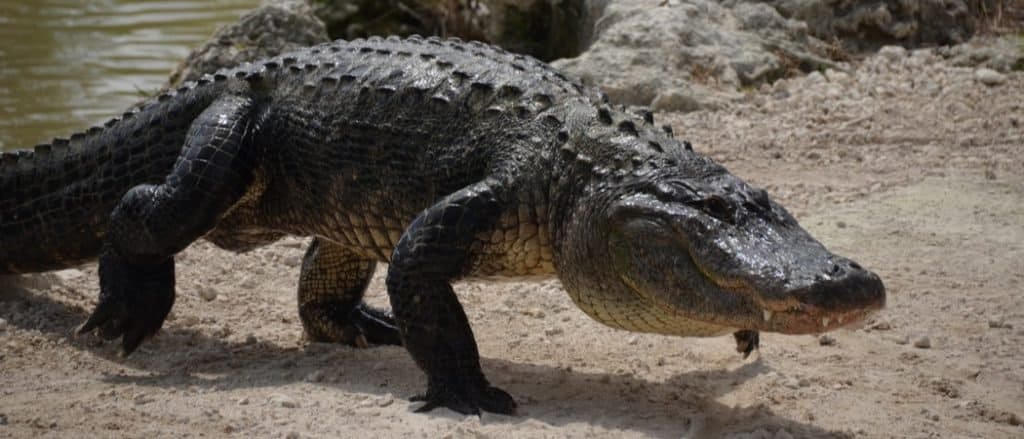
Alligators bite enemies and then “death roll”, viciously tossing and dismembering their foes.
©Rod Zadeh/Shutterstock.com
Pythons rely on their skills as ambush predators to attack and kill enemies. They will often lay in wait until prey comes by before making their move. Pythons bite their prey, sink their teeth in, and then coil their body around their prey while constricting it.
Alligators are ambush predators, too. They’ll wait on the water’s edge and then drag an enemy into the water with them, inflicting a vicious combination of bites and drowning on their prey.
When facing a larger creature, they’ll often bite a limb or a spot on the body, clamp down, and perform a “death roll.” By rolling their body over and over, they can rip large chunks from their prey, causing immense soft tissue damage and eventual death.
Alligators are more versatile and deadly, so they have the advantage in terms of combat skills.
What Are Key Differences Between a Python and an Alligator?
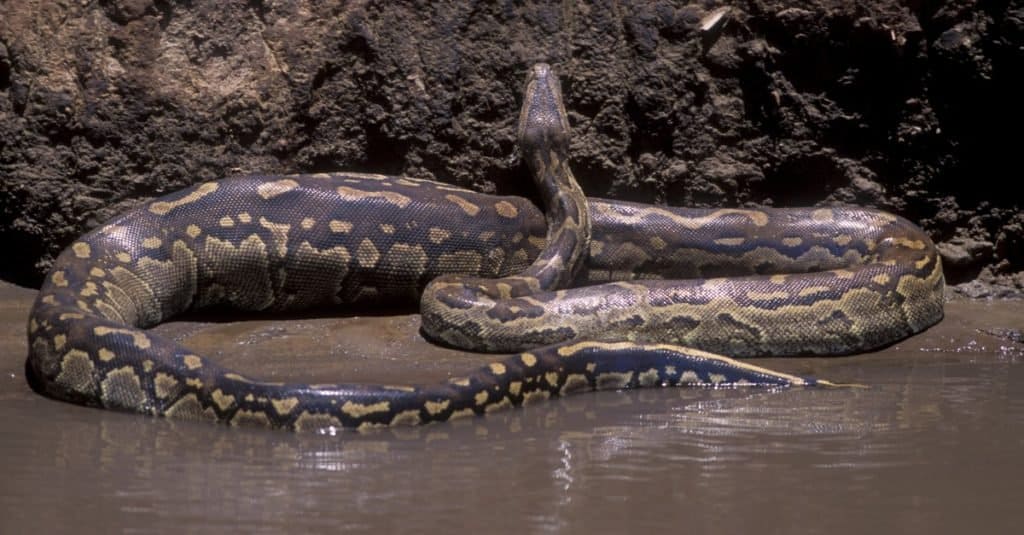
Although pythons are longer than alligators, they’re not as heavy or fast.
©zaferkizilkaya/Shutterstock.com
Pythons are longer than alligators. However, alligators weigh more than pythons. Alligators are also quicker than pythons on land and in the water. Pythons crush their prey to death while alligators use their teeth to break bones and dismember prey.
Alligators have a small range including the Southern United States and parts of Asia, and pythons can be found in South-East Asia and a small portion of Florida in the U.S. as an invasive species. These are the most significant differences between the two creatures.
Who Would Win in a Fight Between a Python and an Alligator?
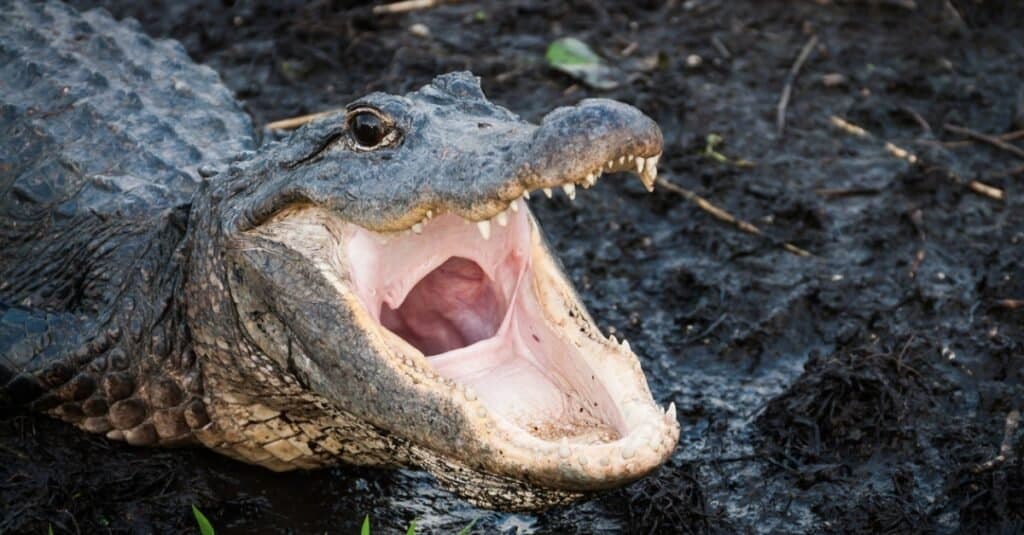
An alligator would beat a python in a fight.
©iStock.com/unclegene
An alligator would win a fight against a python in most cases. To be clear, this is assuming that the alligator is fully grown. At their full size, alligators have the power to ward off or outright kill a python. A python would have to be much longer and stronger than the alligator to kill it, and that certainly happens in the wild.
Yet, it’s more likely that an average adult alligator would be large enough to kill the average adult python. The fight could happen in many ways, but it would most likely start near the water. Alligators love when something creeps into their water for an ambush.
The python has good senses, but it wouldn’t pick up a cold-blooded alligator with most of its body under the water. It would slink into the swampy water, and the gator’s senses would pick up on the vibrations of the snake. The python would be met by the teeth of a gator clamping down on it. It would probably retaliate, biting and trying to coil around the gator, but the gator has a surprise of its own.
The alligator would bite and twirl, foiling the python’s attempts at coiling around it and dealing fatal damage to its foe.
What Animal Can Take Down an American Alligator?
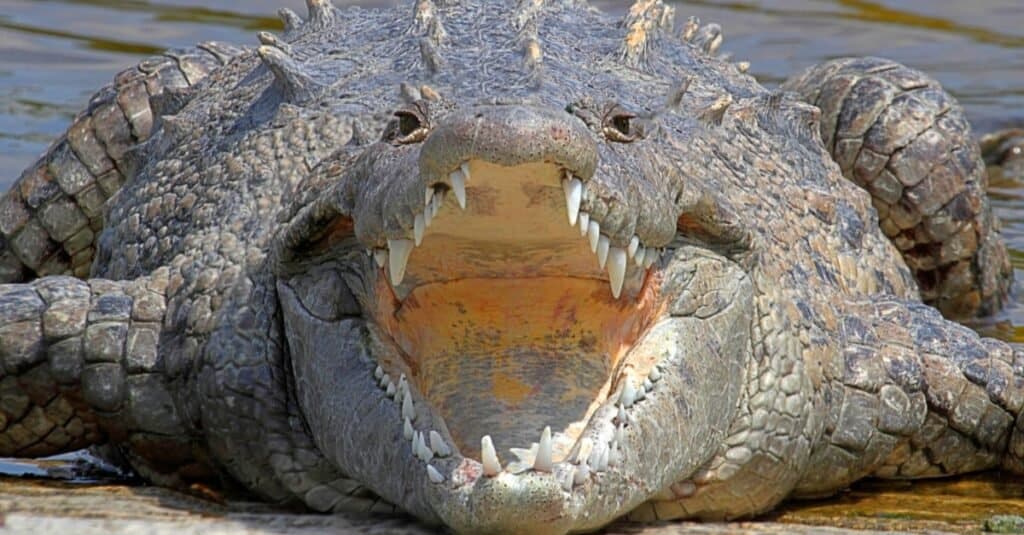
American crocodiles are capable of outweighing American alligators and have a greater bite force.
©iStock.com/SteveByland
The American crocodile: Known to reach 1,186 lbs in weight and 20 feet in length, the American crocodile is also known to have a bite force of 2980 psi. As a result, it is one of the few animals which is capable of taking on the American alligator.
The American alligator on the other hand is only capable of making it to 15.1 feet, and 1,000 lbs in weight. And while its bite force is certainly impressive at 2,000 lbs, it is significantly surpassed by the former.
These qualities show that the American crocodile might have the upper hand in the event of its taking on its darker-scaled neighbor known for its broader snout and ability to tolerate comparatively cooler climes. This is all the more especially likely in the event of the American crocodile being larger than the alligator.
The photo featured at the top of this post is © iStock.com/Lunatic_67
Thank you for reading! Have some feedback for us? Contact the AZ Animals editorial team.






